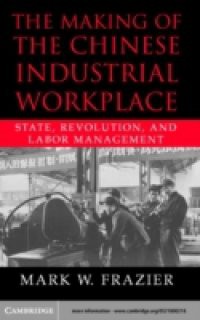State workers in China have until recently enjoyed the 'iron rice bowl' of comprehensive cradle-to-grave benefits and lifetime employment. This central institution in Chinese politics emerged over the course of various crises that swept through China's industrial sector prior to and after revolution in 1949. Frazier explores critical phases in the expansion of the Chinese state during the middle third of the twentieth century to reveal how different labour institutions reflected state power. While the 'iron rice bowl' is usually seen as an outgrowth of Communist labour policy, Frazier's account shows that is has longer historical roots. As a product of the Chinese state, the iron rice bowl's dismantling in the 1990s has raised sensitive issues about the way in which the contemporary Chinese state exerts control over urban industrial society. This book sheds light on state and society relations in China under the Nationalist and Communist regimes.

